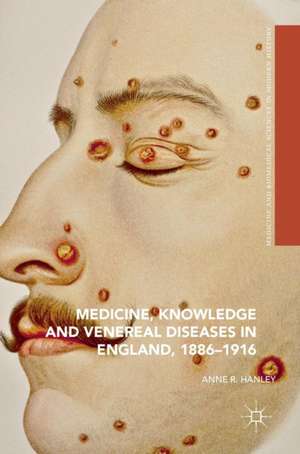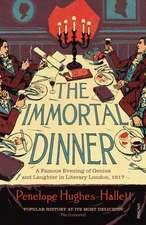Medicine, Knowledge and Venereal Diseases in England, 1886-1916: Medicine and Biomedical Sciences in Modern History
Autor Anne R. Hanleyen Limba Engleză Hardback – 11 noi 2016
| Toate formatele și edițiile | Preț | Express |
|---|---|---|
| Paperback (1) | 639.73 lei 6-8 săpt. | |
| Springer International Publishing – 27 iun 2018 | 639.73 lei 6-8 săpt. | |
| Hardback (1) | 645.14 lei 6-8 săpt. | |
| Springer International Publishing – 11 noi 2016 | 645.14 lei 6-8 săpt. |
Din seria Medicine and Biomedical Sciences in Modern History
-
 Preț: 454.16 lei
Preț: 454.16 lei - 20%
 Preț: 691.97 lei
Preț: 691.97 lei -
 Preț: 282.19 lei
Preț: 282.19 lei - 20%
 Preț: 691.10 lei
Preț: 691.10 lei - 18%
 Preț: 781.77 lei
Preț: 781.77 lei - 15%
 Preț: 650.69 lei
Preț: 650.69 lei - 15%
 Preț: 584.26 lei
Preț: 584.26 lei - 18%
 Preț: 727.80 lei
Preț: 727.80 lei -
 Preț: 167.93 lei
Preț: 167.93 lei - 18%
 Preț: 786.04 lei
Preț: 786.04 lei - 15%
 Preț: 650.37 lei
Preț: 650.37 lei -
 Preț: 231.67 lei
Preț: 231.67 lei - 15%
 Preț: 585.90 lei
Preț: 585.90 lei -
 Preț: 220.13 lei
Preț: 220.13 lei - 15%
 Preț: 585.40 lei
Preț: 585.40 lei - 18%
 Preț: 997.71 lei
Preț: 997.71 lei - 18%
 Preț: 785.11 lei
Preț: 785.11 lei - 18%
 Preț: 780.68 lei
Preț: 780.68 lei - 15%
 Preț: 643.00 lei
Preț: 643.00 lei - 18%
 Preț: 780.68 lei
Preț: 780.68 lei - 18%
 Preț: 900.94 lei
Preț: 900.94 lei - 18%
 Preț: 732.52 lei
Preț: 732.52 lei
Preț: 645.14 lei
Preț vechi: 758.99 lei
-15% Nou
Puncte Express: 968
Preț estimativ în valută:
123.46€ • 128.42$ • 101.93£
123.46€ • 128.42$ • 101.93£
Carte tipărită la comandă
Livrare economică 15-29 aprilie
Preluare comenzi: 021 569.72.76
Specificații
ISBN-13: 9783319324548
ISBN-10: 3319324543
Pagini: 374
Ilustrații: XIII, 318 p. 9 illus., 2 illus. in color.
Dimensiuni: 148 x 210 x 24 mm
Greutate: 0.55 kg
Ediția:1st ed. 2016
Editura: Springer International Publishing
Colecția Palgrave Macmillan
Seria Medicine and Biomedical Sciences in Modern History
Locul publicării:Cham, Switzerland
ISBN-10: 3319324543
Pagini: 374
Ilustrații: XIII, 318 p. 9 illus., 2 illus. in color.
Dimensiuni: 148 x 210 x 24 mm
Greutate: 0.55 kg
Ediția:1st ed. 2016
Editura: Springer International Publishing
Colecția Palgrave Macmillan
Seria Medicine and Biomedical Sciences in Modern History
Locul publicării:Cham, Switzerland
Cuprins
Introduction. - 1. Training competent generalists. - 2. Postgraduate specialism. - 3. Under the microscope. - 4. Clinical practice and patient care. - 5. Nursing knowledge. - 6. Midwifery and ophthalmia neonatorum. - Conclusions.
Recenzii
“The book begins with the training of competent general practitioners. Like infectious diseases more generally, it proved a tough job to find time for venereology in the medical student curriculum.” (Graham Mooney, Journal of the History of Medicine and Allied Sciences, Vol. 74 (3), July, 2019)
“This book considers the societal, legislative, scientific and medical changes that influenced our understanding of, and responses to, syphilis and gonorrhoea. … it richly illustrates the problems faced by healthcare professionals and contains a wealth of information of interest to the more general reader.” (Tim Mason, BSHM British Society for the History of Medicine, bshm.org.uk, July, 2017)
Notă biografică
Anne Hanley is a Junior Research Fellow at the University of Oxford. After completing her PhD in History at the University of Cambridge, she worked with the Centre for History and Philosophy of Science and the Museum of the History of Science, Technology and Medicine at the University of Leeds. Her research interests are in the social history of medicine and healthcare during the nineteenth and twentieth centuries, along with closely related themes in gender, political and economic history. She has published on the history of infertility, midwifery, medical education and nineteenth-century clinical experimentation.
Textul de pe ultima copertă
This book reveals the ever-present challenges of patient care at the forefront of medical knowledge. Syphilis and gonorrhoea played upon the public imagination in Victorian and Edwardian England, inspiring both fascination and fear. Seemingly inextricable from the other great ‘social evil’, prostitution, these diseases represented contamination, both physical and moral. They infiltrated respectable homes and brought terrible suffering and stigma to those afflicted. Medicine, Knowledge and Venereal Diseases takes us back to an age before penicillin and the NHS, when developments in pathology, symptomology and aetiology were transforming clinical practice. It will be the first book to examine systematically how doctors, nurses and midwives grappled with new knowledge and laboratory-based technologies in their fight against venereal diseases in voluntary hospitals, general practice and Poor Law institutions. It opens up new perspectives on what made competent and safe medical professionals; how these standards changed over time; and how changing attitudes and expectations affected the medical authority and autonomy of different professional groups.
Caracteristici
Uncovers and charts the great variations in knowledge and skill among doctors, nurses and midwives who treated venereal diseases across a wide range of medical institutions Deconstructs the notion of medicine as monolithic, revealing the uneven adoption of new ideas, diagnostic innovations and therapeutic technologies Contributes significantly to broader debates in the history of medicine and the sociology of scientific knowledge







